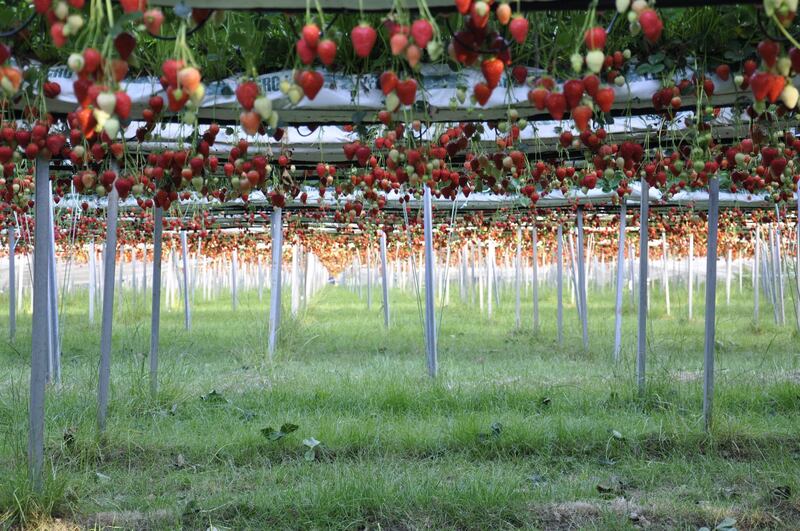In Kent, the “Garden of England”, Brexit uncertainty is already beginning to bite for the county’s thriving fruit farmers.
British producers have enjoyed booming business in recent years. In 2016 soft fruit contributed £2 billion (Dh9.5 billion) to the UK economy.
Despite being one of the 28-member bloc’s smallest fruit-growing nations, the British horticulture industry hires 60,000 seasonal workers from the EU every year.
But since the Brexit vote two years ago, the number of such workers travelling from the EU to the UK has fallen, leading to warnings that labour shortages could mean unpicked fruit is left to rot in the fields.
For Sean Charlton, who owns Charltons, a leading British grower of strawberries, cherries and apples, workers from EU countries such as Romania and Bulgaria are the lifeblood of his business. His fruit, which is grown across 390 hectares of land, is sold to major retailers across Britain.
Mr Charlton, who employs up to 1,000 workers in the peak summer season, has found it more difficult this year to recruit fruit pickers.
"Brexit is causing a lot of uncertainty for my workers," he told The National from his farm in Langley, Kent.
“There’s people not coming over because they feel they’re not welcome or their stay will be short-lived. Is the barrier going to drop? The exchange rate is not very good either, which makes other countries, such as Germany, more attractive.”
Evija Udre from Latvia works as an in-house recruiter for Charltons, a position created in response to the growing need for more labour.
“There are lots of questions,” she said. “Are we going to be forced to leave? Is it safe to settle and plan a life here? It’s all about earnings and feeling safe.”
Ms Udre came to Britain in 2014 and began her career at Charltons as a fruit picker before being promoted. She is one of many EU migrant workers who are still unsure whether they can remain in the country, despite there being just six months to go until Brexit.
In Kent, voters were strongly in favour of Brexit. Fifty-nine per cent voted to leave compared with 51.9 per cent nationally. It was widely seen as a vote against immigration, in particular from eastern Europe.
“The people here that do not speak English that well feel more unwelcome [since Brexit] because they only hear the worst things,” Ms Udre explained. “They feel disappointed that people have a bad impression of their nationality.”
Mr Charlton, who did not vote in the 2016 referendum, said he sympathised with some of his pro-Brexit countrymen’s concerns but added that no British people applied to work on his farm.
“No foreigner is taking any English person’s job,” he said. “There’s plenty of work for everyone.”

Last week, the British government, in response to pressure from the farming industry, announced plans to allow 2,500 workers from non-EU countries such as Ukraine and India to work on farms across Britain. The scheme is seen as a reintroduction of a previous seasonal agricultural workers initiative (known as Saws), which ended in 2013 when migrants from Romania and Bulgaria were given freedom of movement across the EU.
_______________
Read more: UK to pilot new visa system for non-EU farm workers
_______________
But the plans faced criticism as soon as they were announced. Farming unions said the number of permits were not enough to sustain the British horticulture industry.
Nick Marston, chairman of the British Summer Fruits industry body, said: “To have any effect in terms of supporting our successful industry, around 10,000 are needed now – not 2,500. This number will have little effect on the current shortages UK farms are facing as we speak. The proposal represents a 4 per cent increase in a shrinking workforce.”
“The British berry industry is a great success story. We are nearly 100 per cent self-sufficient for a long period of the year, and we need this level of support if we are to continue to thrive and grow,” he added.
Mr Charlton said he welcomed the government’s new initiative, which would allow him to recruit workers from places like Ukraine, but added that he would need about half of the 2,500 work permits allotted to farms nationally.
As for Brexit, he feels hopeful that changes in seasonal workers’ status will be worked out sensibly by the government. “We’ve done this before, we’ll make it work. But I’d still rather not go down that road.”







